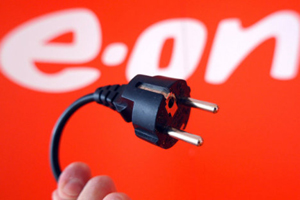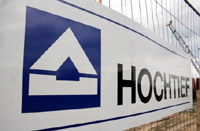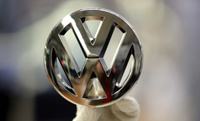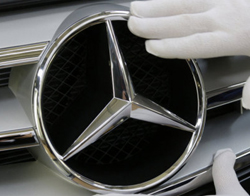VIPsight - February 2011
COMPANIES
E.ON buys back bonds
 Other companies use their cash reserves to buy back shares or give special bonuses to their shareholders. Germany’s biggest energy group E.ON, on the other hand, buys back loans from its investors on a large scale. The focus is on six securities with interest rates between 4.125 and 5.25 percent and a maturity of one to three years. Financial Times Deutschland calculates the total amount at up to 7.1 billion euros. The goal is to reduce group liabilities and thus interest payments. In the wake of the expansionary acquisition policies of former E.ON CEO Wulf Bernotat the Düsseldorfers have accumulated nearly 45 billion euros of debts. Late last year, his successor Johannes Teyssen, as part of his restructuring programme, got rid of the gas network subsidiary in Italy and the shares in Russian gas company Gazprom. It is simply too expensive to be deeper in debt, according to the group. The acceptance period for the three outstanding MDA notes ran until 4 February.
Other companies use their cash reserves to buy back shares or give special bonuses to their shareholders. Germany’s biggest energy group E.ON, on the other hand, buys back loans from its investors on a large scale. The focus is on six securities with interest rates between 4.125 and 5.25 percent and a maturity of one to three years. Financial Times Deutschland calculates the total amount at up to 7.1 billion euros. The goal is to reduce group liabilities and thus interest payments. In the wake of the expansionary acquisition policies of former E.ON CEO Wulf Bernotat the Düsseldorfers have accumulated nearly 45 billion euros of debts. Late last year, his successor Johannes Teyssen, as part of his restructuring programme, got rid of the gas network subsidiary in Italy and the shares in Russian gas company Gazprom. It is simply too expensive to be deeper in debt, according to the group. The acceptance period for the three outstanding MDA notes ran until 4 February.
Observers see the move by the Düsseldorf-based company as the start of a debt relief offensive in Germany. Thanks to the strong economy, corporate coffers are currently bulging. Since German companies, unlike their US counterparts, have so far held back from costly acquisitions, they have room to reduce their debts through bond repurchases. Because in the wake of the Lehman default in 2008 many companies were able to stock up on money only short-term, the experts expect a wave of bond refinancings in coming years. According to data from the Swiss UBS Bank, in 2010 30 European companies already bought back bonds. Particularly for companies expecting rising interest rates, it might be worth exchanging their own bonds for lower-interest securities or paying them off altogether. However, in addition to costs for the repurchase, premiums are as a rule incurred, to make a buy-back lucrative to the investor.
ACS grabs Hochtief
 The Spanish construction company ACS has secured an around 31.59 percent stake in the German construction giant Hochtief in connection with the bid submitted in December. At the end the Spaniards had lifted their offer from eight to nine ACS shares for five Hochtief ones. The Federal Financial Supervisory Authority (BaFin) could find no illicit agreements between ACS and the financial investor, Southeastern Asset Management, which holds shares in both ACS and Hochtief, and waved the transaction through. This paved the way for the Spaniards to purchase additional shares in the Essen-based group and in the long term incorporate Hochtief entirely. The German company is valued on the stock exchange at five billion euros and has liquid funds of €2.58 billion. In addition, the 55-percent share in Australian subsidiary Leighton alone is worth four billion euros. The last trump for Hochtief is now only a new capital increase, which would dilute the ACS share to below 30 percent. The Spaniards would then have to submit a new offer if they wanted to cross the 30-percent threshold again. To prevent ACS representatives from moving onto the supervisory board, Hochtief as well as shareholder association Schutzgemeinschaft der Kapitalanleger (SdK) have called for small shareholders to attend the shareholders' meeting planned for May 12th and stop the ACS project by a strong presence.
The Spanish construction company ACS has secured an around 31.59 percent stake in the German construction giant Hochtief in connection with the bid submitted in December. At the end the Spaniards had lifted their offer from eight to nine ACS shares for five Hochtief ones. The Federal Financial Supervisory Authority (BaFin) could find no illicit agreements between ACS and the financial investor, Southeastern Asset Management, which holds shares in both ACS and Hochtief, and waved the transaction through. This paved the way for the Spaniards to purchase additional shares in the Essen-based group and in the long term incorporate Hochtief entirely. The German company is valued on the stock exchange at five billion euros and has liquid funds of €2.58 billion. In addition, the 55-percent share in Australian subsidiary Leighton alone is worth four billion euros. The last trump for Hochtief is now only a new capital increase, which would dilute the ACS share to below 30 percent. The Spaniards would then have to submit a new offer if they wanted to cross the 30-percent threshold again. To prevent ACS representatives from moving onto the supervisory board, Hochtief as well as shareholder association Schutzgemeinschaft der Kapitalanleger (SdK) have called for small shareholders to attend the shareholders' meeting planned for May 12th and stop the ACS project by a strong presence.
Qatar stands by Volkswagen
 The influence of the Emirate of Qatar at Volkswagen is consolidating. The Arabs already have 17 percent of the shares in the Wolfsburgers, and are represented on the supervisory board. Now, reports Financial Times Deutschland, the Emirate will replace RWE CEO Juergen Großmann at the General Meeting on 3 May. That would give the Qataris two seats on the supervisory board. Only in mid-January, Qatar Holding agreed to join in subscribing a planned capital increase at Porsche totalling five billion euros. In order to maintain their ten-percent stake in the Stuttgart sports-car manufacturer, the Arabs will put a three-digit million euro amount on the table. The capital increase should reduce the debt at Porsche of six billion euros, which the sports-car maker has amassed in the failed battle to take over Volkswagen. At the end of the year a green light for the merger came from the US: a New York court had rejected the billion-dollar suit by several funds for compensation from Porsche.
The influence of the Emirate of Qatar at Volkswagen is consolidating. The Arabs already have 17 percent of the shares in the Wolfsburgers, and are represented on the supervisory board. Now, reports Financial Times Deutschland, the Emirate will replace RWE CEO Juergen Großmann at the General Meeting on 3 May. That would give the Qataris two seats on the supervisory board. Only in mid-January, Qatar Holding agreed to join in subscribing a planned capital increase at Porsche totalling five billion euros. In order to maintain their ten-percent stake in the Stuttgart sports-car manufacturer, the Arabs will put a three-digit million euro amount on the table. The capital increase should reduce the debt at Porsche of six billion euros, which the sports-car maker has amassed in the failed battle to take over Volkswagen. At the end of the year a green light for the merger came from the US: a New York court had rejected the billion-dollar suit by several funds for compensation from Porsche.
Capital writedown at Conergy
 Already since 2008, photovoltaic manufacturers Conergy were sailing with a considerable list in difficult waters; after the departure of CEO Andreas von Zitzewitz in August Conergy now drifted leaderless into the next disaster. In mid-January the Hamburg-based company had to tell its shareholders it had lost half the equity. Trading in the stock was suspended for a short time after this bad news. When it resumed, the share price was down 12.9% to only 45 cents. The loss of 190 million euros resulted from the revaluation of a loan receivable from a subsidiary. At a forced Extraordinary General Meeting scheduled for the 25th of February, shareholders now have to bring a capital writedown and subsequent capital increase on the way. The capital of some 400 million euros is to be reduced to 50 million euros, and in a second step increased to €188 million. This measure was already worked out in December in cooperation with Commerzbank and two hedge funds. The two hedge funds York and Sothic will thereafter hold the majority stake. A further complication is that rebel shareholders after 2008 have once again brought an action against the decisions of the last ordinary general meeting: they want to ensure that the decisions on discharge to the Executive and Supervisory Boards as well as the authorization to increase capital and issue convertible bonds will be withdrawn. As early as 2008, Conergy had to reach an expensive settlement with the then plaintiff shareholders. Thanks to the new shareholders’ approval process the position of the rebels is weaker this time; Conergy is at least not threatened with a blockade of its decisions, but if the company’s proposed capital reduction does not succeed on 25 February, then management would have to rely on the contested decisions.
Already since 2008, photovoltaic manufacturers Conergy were sailing with a considerable list in difficult waters; after the departure of CEO Andreas von Zitzewitz in August Conergy now drifted leaderless into the next disaster. In mid-January the Hamburg-based company had to tell its shareholders it had lost half the equity. Trading in the stock was suspended for a short time after this bad news. When it resumed, the share price was down 12.9% to only 45 cents. The loss of 190 million euros resulted from the revaluation of a loan receivable from a subsidiary. At a forced Extraordinary General Meeting scheduled for the 25th of February, shareholders now have to bring a capital writedown and subsequent capital increase on the way. The capital of some 400 million euros is to be reduced to 50 million euros, and in a second step increased to €188 million. This measure was already worked out in December in cooperation with Commerzbank and two hedge funds. The two hedge funds York and Sothic will thereafter hold the majority stake. A further complication is that rebel shareholders after 2008 have once again brought an action against the decisions of the last ordinary general meeting: they want to ensure that the decisions on discharge to the Executive and Supervisory Boards as well as the authorization to increase capital and issue convertible bonds will be withdrawn. As early as 2008, Conergy had to reach an expensive settlement with the then plaintiff shareholders. Thanks to the new shareholders’ approval process the position of the rebels is weaker this time; Conergy is at least not threatened with a blockade of its decisions, but if the company’s proposed capital reduction does not succeed on 25 February, then management would have to rely on the contested decisions.
Springer takes over Seloger
With a markup of €4.05 to now €38.05 per share, Axel Springer has crushed the resistance at Seloger. The offer, upped on 18 January by twelve percent, values the French real-estate portal company at €634 million. The Supervisory Board of Seloger recommended its shareholders to accept the offer because the bid now reflects the true value and growth prospects of the online company. The original offer of 34 euros was rejected by the company as too low and the AMF’s takeover permission challenged at the Paris Court of Appeal. The requirement for the new offer is a minimum acceptance rate of 50.01 percent, inclusive of the already acquired 12.4 percent.
EU searches MAN and Daimler

 Several European truck manufacturers had an unannounced visit by EU competition watchdogs on 18 January. The reason is the suspicion MAN, Scania and Daimler could have breached provisions for the prohibition of cartels and abuse of dominant position. The EU Competition Commission, while confirming the searches, stressed that the operation does not imply that the companies concerned had actually behaved illegally. The suspects announced their willingness to cooperate with the competition watchdogs. Already in September 2010 British antitrust authorities had searched Daimler offices near London, and submitted written questions to Scania and MAN.
Several European truck manufacturers had an unannounced visit by EU competition watchdogs on 18 January. The reason is the suspicion MAN, Scania and Daimler could have breached provisions for the prohibition of cartels and abuse of dominant position. The EU Competition Commission, while confirming the searches, stressed that the operation does not imply that the companies concerned had actually behaved illegally. The suspects announced their willingness to cooperate with the competition watchdogs. Already in September 2010 British antitrust authorities had searched Daimler offices near London, and submitted written questions to Scania and MAN.
ProSieben owners sell shares
Kohlberg Kravis Roberts (KKR) and Permira have taken nearly €200 million with the sale of eight million ProSiebenSat.1 preference shares at €24.20 each. The two private-equity firms initiated an accelerated book-building process for the sale of a 3.7 percent stake to institutional investors, they say. With the proceeds, the financial investors want to pay back debts they have accumulated in Lavena Holding. After the placement KKR / Permira keep an unchanged 88 per cent of the ordinary shares and just under 18 percent of the prefence shares, so that 53 percent of the share capital of ProSiebenSat.1 is now bundled in the Lavena group.
Counter-motion at Siemens fails
 The association of employee shareholders of Siemens had put a counter-motion for the Annual General Meeting on 25 January, proposing significantly lower pay than the administration. The motion said that Supervisory Board members should be paid only about half of what the administration proposed. Siemens, however, wanted variable components of compensation for Supervisory Board members completely eliminated and in future replaced by flat-rate pay of €140,000 independently of the company's success. Ultimately, the group's proposal was approved by a majority of 93.2 percent. Among the proponents of fixed remuneration was also shareholder association Deutsche Schutzvereinigung für Wertpapierbesitz, which contrary to the Corporate Governance Code said that "in future only fixed salaries without variables should be used."
The association of employee shareholders of Siemens had put a counter-motion for the Annual General Meeting on 25 January, proposing significantly lower pay than the administration. The motion said that Supervisory Board members should be paid only about half of what the administration proposed. Siemens, however, wanted variable components of compensation for Supervisory Board members completely eliminated and in future replaced by flat-rate pay of €140,000 independently of the company's success. Ultimately, the group's proposal was approved by a majority of 93.2 percent. Among the proponents of fixed remuneration was also shareholder association Deutsche Schutzvereinigung für Wertpapierbesitz, which contrary to the Corporate Governance Code said that "in future only fixed salaries without variables should be used."
D&O insurance covers Sky’s damages
 Sky Deutschland has had manager-liability insurance costs incurred in an out-of-court settlement for former board members reimbursed. The pay-TV channel would therefore not now be making claims against former directors around Georg Kofler responsible at the time. In the phony subscriber numbers affair, Sky had paid €14.5 million to institutional investors from the USA, Luxembourg, Germany and Switzerland. The plaintiffs’ claims amounted to €242.5 million initially. The TV platform had after the takeover by Rupert Murdoch in 2008 admitted it did not as claimed have three million subscribers, but only 2.4 million.
Sky Deutschland has had manager-liability insurance costs incurred in an out-of-court settlement for former board members reimbursed. The pay-TV channel would therefore not now be making claims against former directors around Georg Kofler responsible at the time. In the phony subscriber numbers affair, Sky had paid €14.5 million to institutional investors from the USA, Luxembourg, Germany and Switzerland. The plaintiffs’ claims amounted to €242.5 million initially. The TV platform had after the takeover by Rupert Murdoch in 2008 admitted it did not as claimed have three million subscribers, but only 2.4 million.















